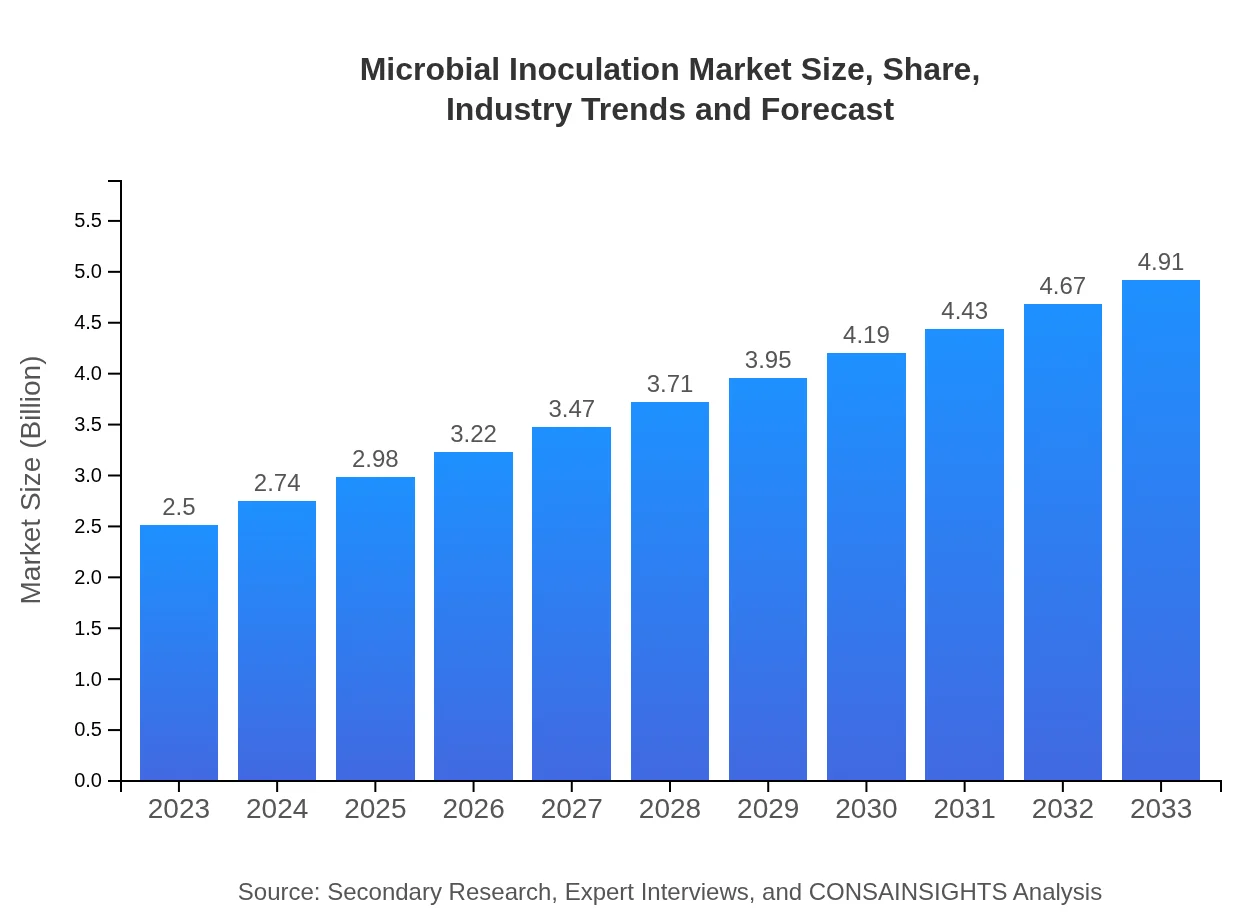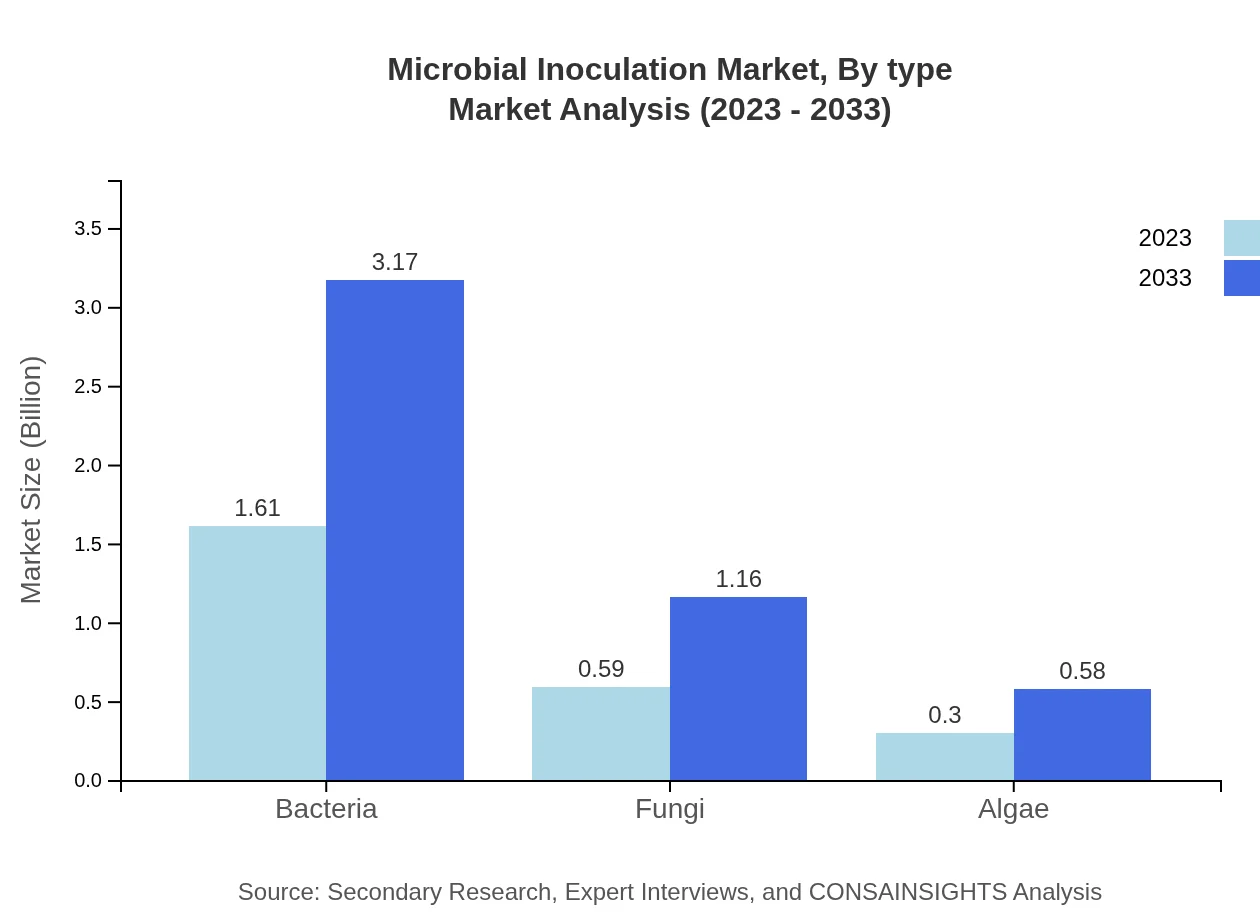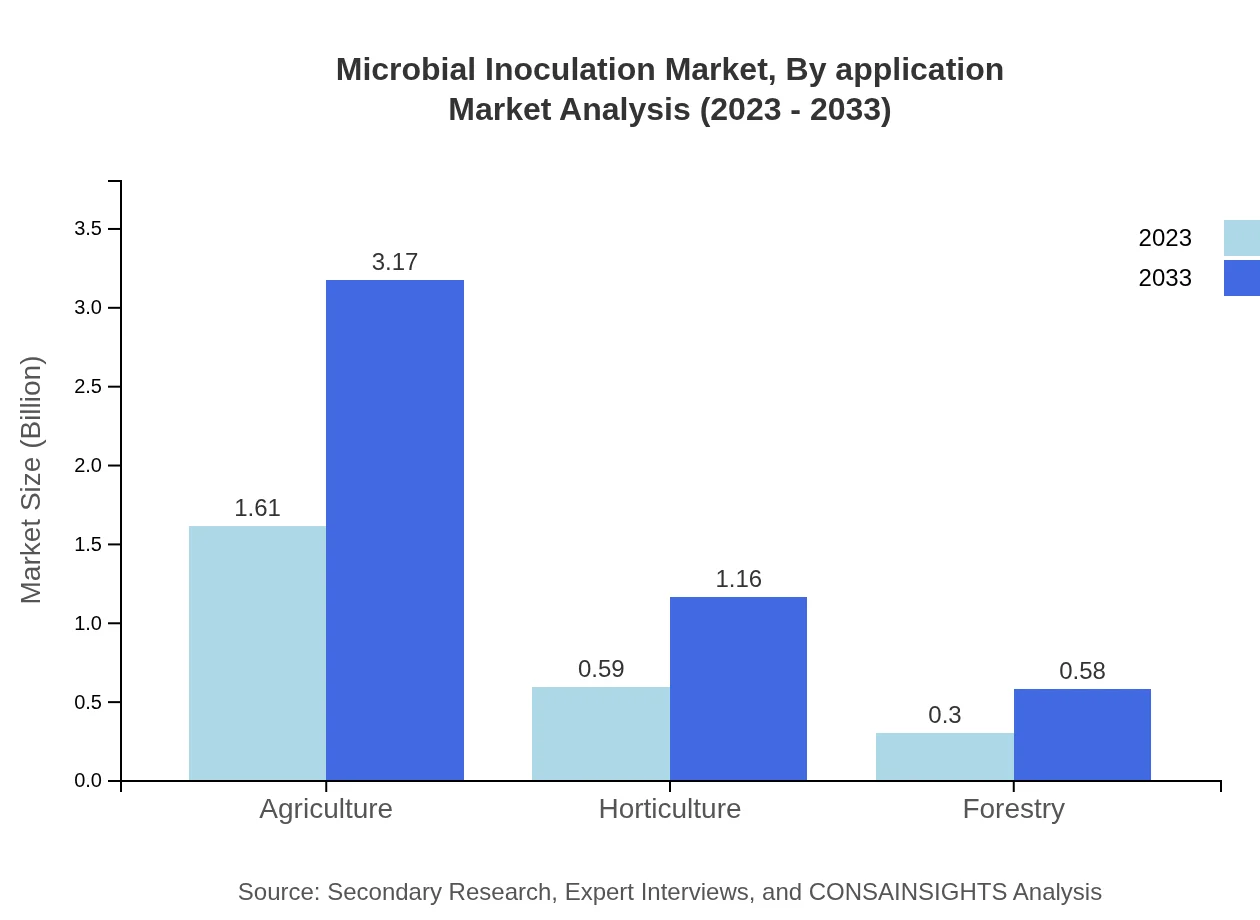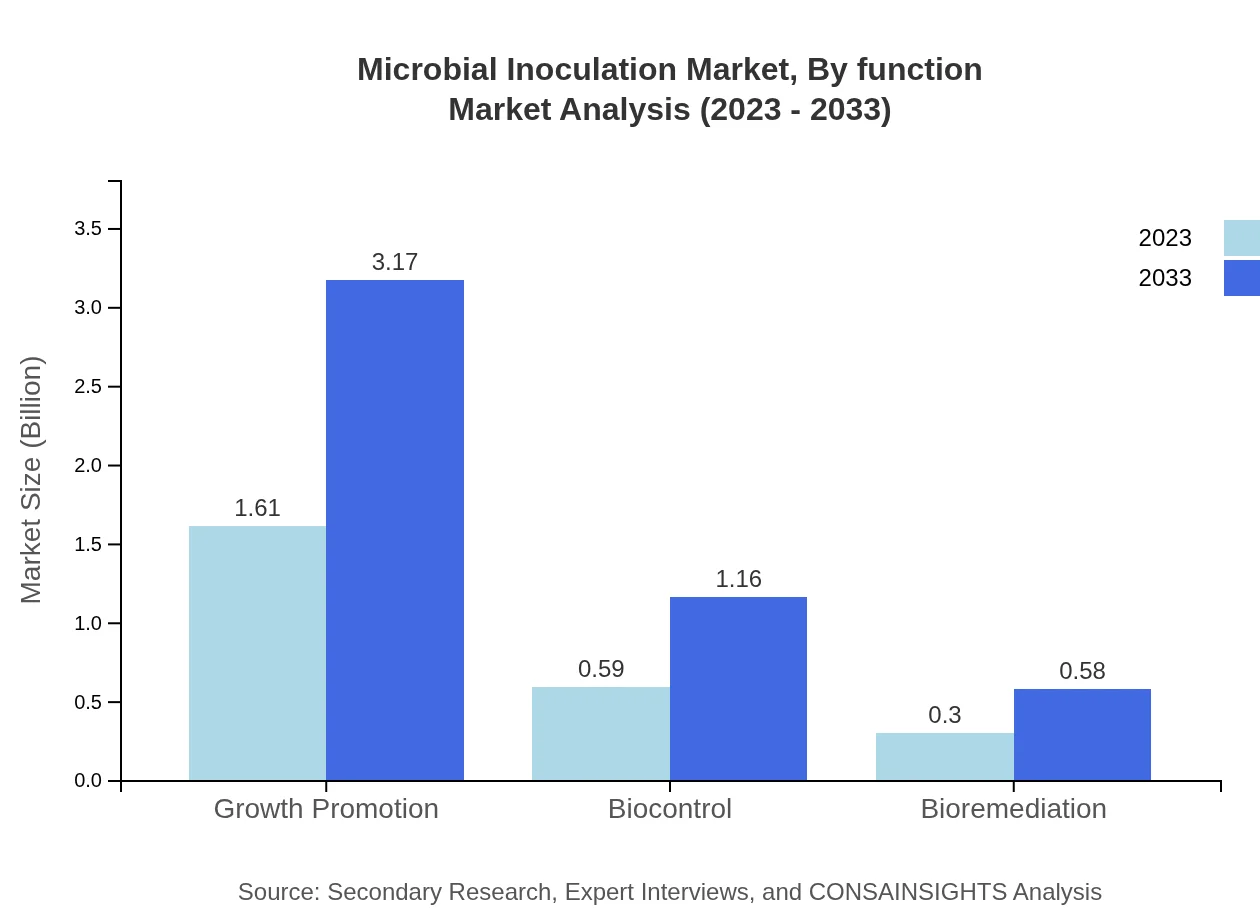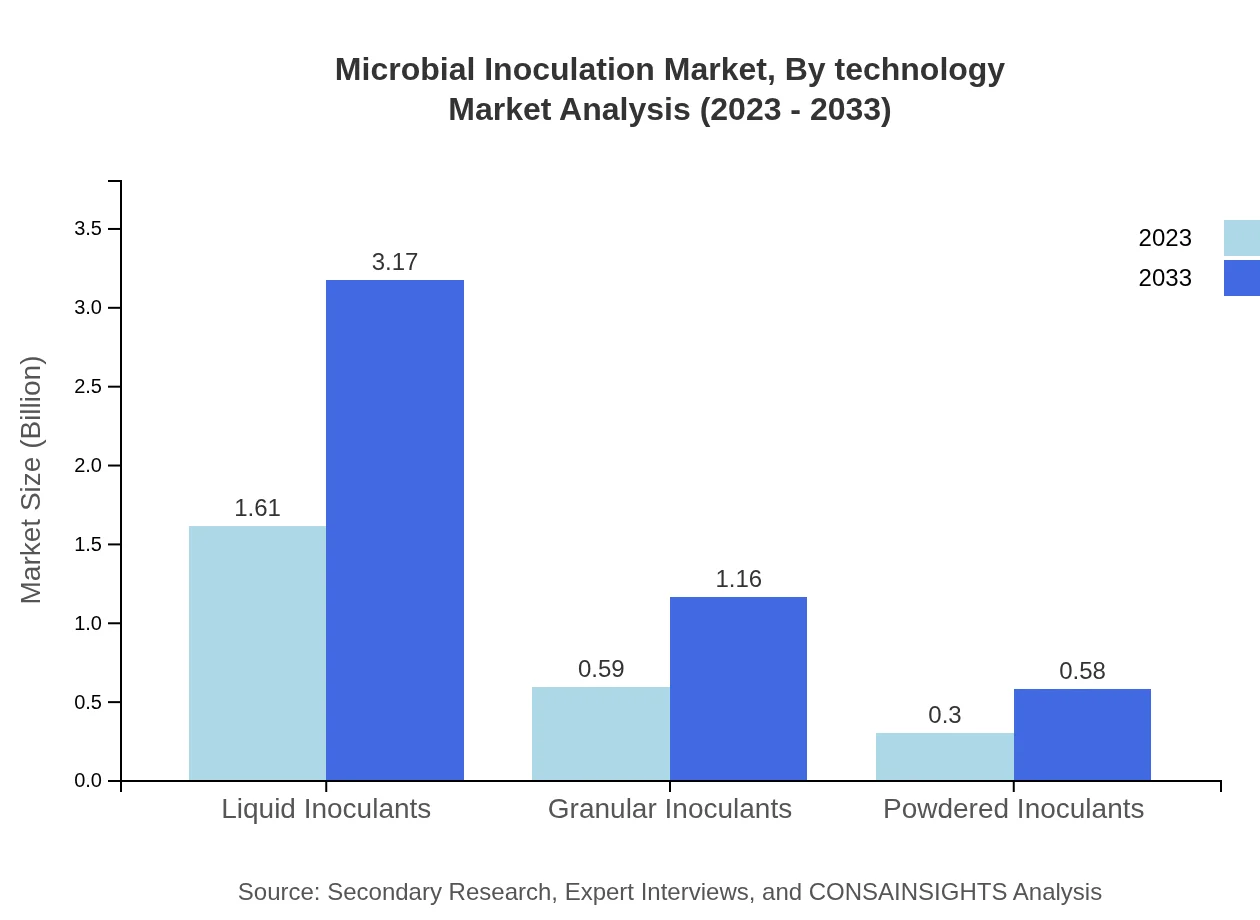Microbial Inoculation Market Report
Published Date: 02 February 2026 | Report Code: microbial-inoculation
Microbial Inoculation Market Size, Share, Industry Trends and Forecast to 2033
This report provides an in-depth analysis of the microbial inoculation market, covering key insights from 2023 to 2033. It details market size, growth rates, segmented analysis, and regional insights along with technological advancements and industry challenges.
| Metric | Value |
|---|---|
| Study Period | 2023 - 2033 |
| 2023 Market Size | $2.50 Billion |
| CAGR (2023-2033) | 6.8% |
| 2033 Market Size | $4.91 Billion |
| Top Companies | BASF SE, Syngenta AG, Novozymes A/S, Bayer AG |
| Last Modified Date | 02 February 2026 |
Microbial Inoculation Market Overview
Customize Microbial Inoculation Market Report market research report
- ✔ Get in-depth analysis of Microbial Inoculation market size, growth, and forecasts.
- ✔ Understand Microbial Inoculation's regional dynamics and industry-specific trends.
- ✔ Identify potential applications, end-user demand, and growth segments in Microbial Inoculation
What is the Market Size & CAGR of Microbial Inoculation market in 2023 and 2033?
Microbial Inoculation Industry Analysis
Microbial Inoculation Market Segmentation and Scope
Tell us your focus area and get a customized research report.
Microbial Inoculation Market Analysis Report by Region
Europe Microbial Inoculation Market Report:
Europe is projected to grow from USD 0.70 billion in 2023 to USD 1.38 billion by 2033. The region's stringent environmental regulations and growing organic farming practices are prime motivators for the adoption of microbial solutions.Asia Pacific Microbial Inoculation Market Report:
The Asia Pacific region is witnessing robust growth in the microbial inoculation market, expected to double from USD 0.48 billion in 2023 to USD 0.94 billion by 2033. Factors driving this growth include the increasing adoption of sustainable farming practices and government initiatives promoting organic agriculture.North America Microbial Inoculation Market Report:
North America leads in the microbial inoculation market, anticipated to grow from USD 0.92 billion in 2023 to USD 1.81 billion by 2033. Increasing regulatory support for biopesticides and organic products is fueling market expansion.South America Microbial Inoculation Market Report:
In South America, the microbial inoculation market is set to expand from USD 0.18 billion in 2023 to USD 0.35 billion by 2033. The region's agricultural sector is recognizing the advantages of microbial products for enhancing crop resilience against climatic challenges.Middle East & Africa Microbial Inoculation Market Report:
The Middle East and Africa’s market for microbial inoculation is expected to increase from USD 0.23 billion in 2023 to USD 0.44 billion by 2033. The enhancing focus on improving agricultural productivity amidst arid conditions is driving the rise in microbial product usage.Tell us your focus area and get a customized research report.
Microbial Inoculation Market Analysis By Type
The microbial inoculation market by type includes: - **Bacteria**: Dominating the market with a size of USD 1.61 billion in 2023 and projected to reach USD 3.17 billion by 2033, holding a significant market share of 64.55%. - **Fungi**: Expected to grow from USD 0.59 billion in 2023 to USD 1.16 billion in 2033, maintaining a share of 23.56%. - **Algae**: Forecasted to increase from USD 0.30 billion in 2023 to USD 0.58 billion by 2033, representing 11.89% of market share.
Microbial Inoculation Market Analysis By Application
The application segmentation includes: - **Agriculture**: Leading the market with a size of USD 1.61 billion in 2023 and projected to attain USD 3.17 billion by 2033, holding a 64.55% market share. - **Horticulture**: Expected to expand from USD 0.59 billion in 2023 to USD 1.16 billion by 2033, accounting for 23.56%. - **Forestry**: Anticipated to grow from USD 0.30 billion in 2023 to USD 0.58 billion by 2033, holding an 11.89% market share.
Microbial Inoculation Market Analysis By Function
Functionally, the segments are: - **Growth Promotion**: With a size of USD 1.61 billion in 2023, set to grow to USD 3.17 billion by 2033, maintaining 64.55% market share. - **Biocontrol**: Expected to increase from USD 0.59 billion in 2023 to USD 1.16 billion by 2033, retaining a 23.56% share. - **Bioremediation**: Anticipated to rise from USD 0.30 billion in 2023 to USD 0.58 billion by 2033, representing 11.89% share.
Microbial Inoculation Market Analysis By Technology
Technological advancements in microbial inoculation include: - The use of precision fermentation to enhance the efficacy of microbial strains. - Developments in encapsulation technologies that improve the delivery and sustained release of inoculants in the soil. - Innovations in bioformulation that enhance the compatibility and synergistic effect of different microbial species for better crop productivity.
Microbial Inoculation Market Trends and Future Forecast
Tell us your focus area and get a customized research report.
Global Market Leaders and Top Companies in Microbial Inoculation Industry
BASF SE:
BASF SE is a global leader in chemicals, producing a wide range of microbial inoculants that enhance crop yield and soil health. Their innovations focus on sustainability and improving farming practices.Syngenta AG:
Syngenta AG specializes in crop protection and genetic engineering, integrating microbial products into their offerings to promote environmental sustainability and enhance agricultural productivity.Novozymes A/S:
A biotech company known for its focus on enzymes and microorganisms, Novozymes A/S develops sustainable agricultural solutions that help improve crop performance and reduce the usage of chemical fertilizers.Bayer AG:
Bayer AG provides advanced microbial inoculants that support integrated pest management and sustainable practices, aiming to enhance global food security.We're grateful to work with incredible clients.









FAQs
What is the market size of microbial Inoculation?
The microbial inoculation market's size is estimated to reach $2.5 billion by 2033, growing at a CAGR of 6.8%. This growth indicates a strong demand for microbial solutions in agriculture, horticulture, and biocontrol applications.
What are the key market players or companies in this microbial inoculation industry?
Key players in the microbial inoculation industry include companies specializing in biofertilizers, biopesticides, and soil amendments. They focus on developing innovative products to enhance crop yield and sustainability.
What are the primary factors driving the growth in the microbial inoculation industry?
Factors driving growth in the microbial inoculation market include the increasing demand for sustainable agricultural practices, rising awareness of chemical hazards, and favorable government initiatives promoting bio-based products.
Which region is the fastest Growing in the microbial inoculation?
The North America region is projected to be the fastest-growing market for microbial inoculation from 2023 to 2033, with market size expanding from $0.92 billion to $1.81 billion.
Does ConsaInsights provide customized market report data for the microbial inoculation industry?
Yes, ConsaInsights offers customized market report data tailored to specific needs within the microbial inoculation industry, ensuring that businesses receive relevant insights for their strategies.
What deliverables can I expect from this microbial inoculation market research project?
Expect comprehensive reports that include market analysis, trends, competitive landscape, segment insights, and regional forecasts, offering a thorough overview of the microbial inoculation market.
What are the market trends of microbial inoculation?
Current trends in microbial inoculation include a rise in the adoption of liquid inoculants, increased R&D investments in bio-based products, and a shift towards organic farming practices that emphasize sustainability.

